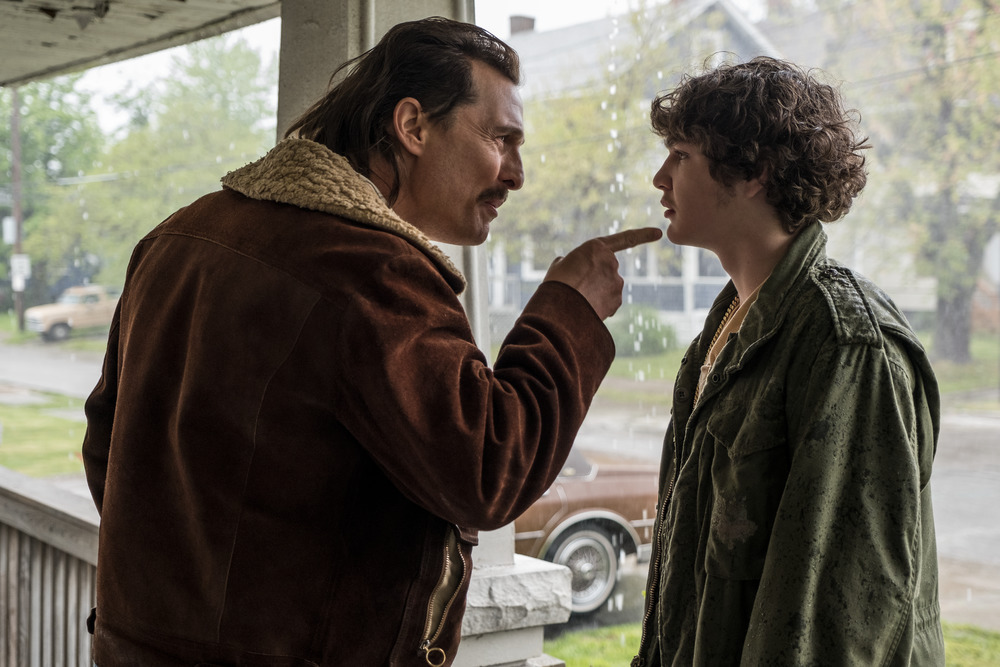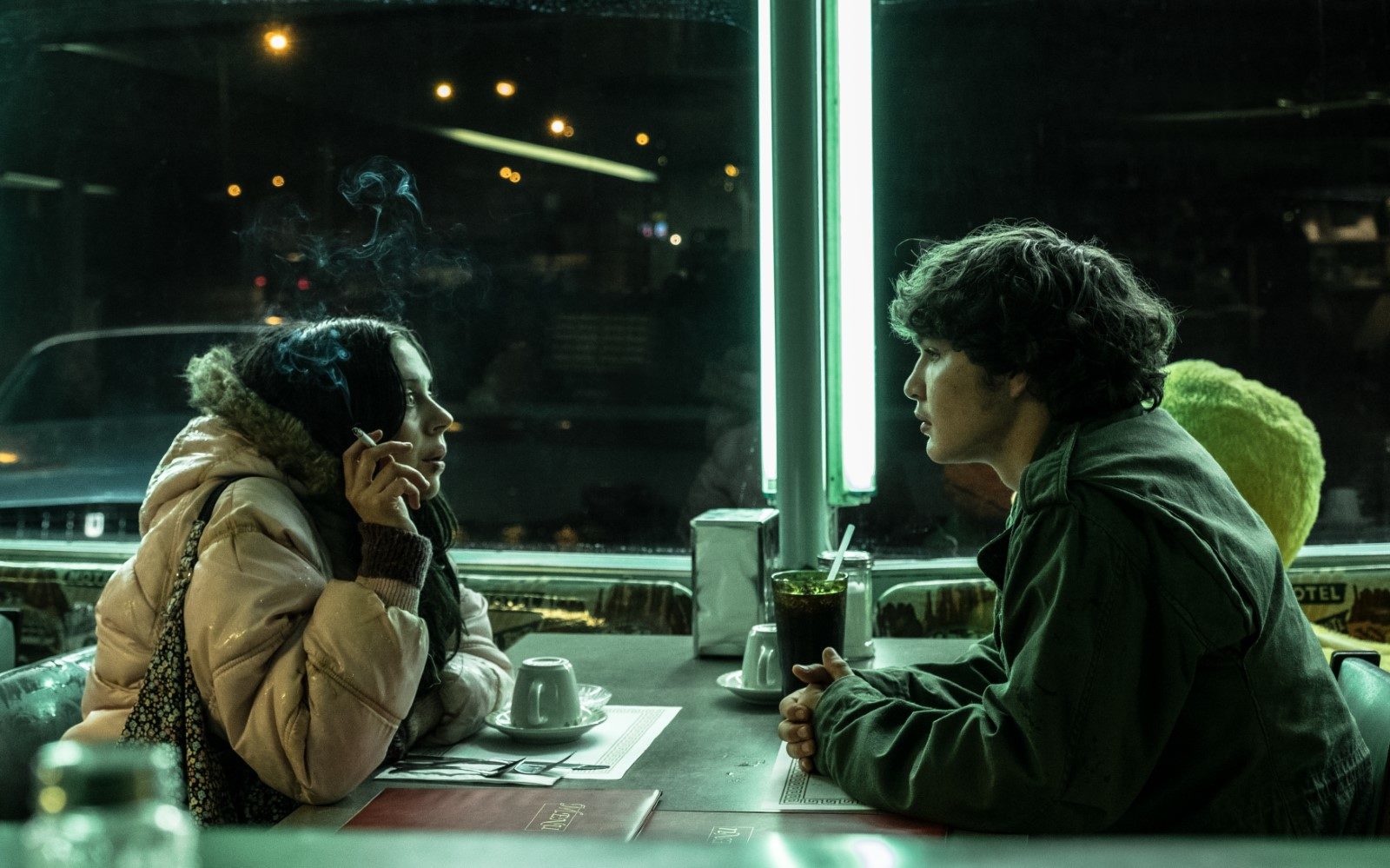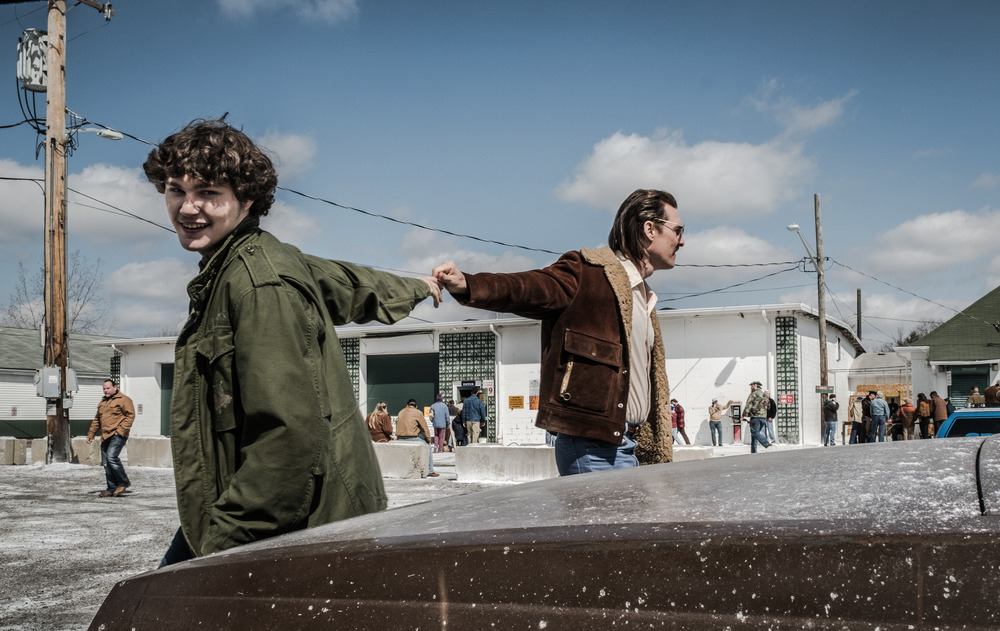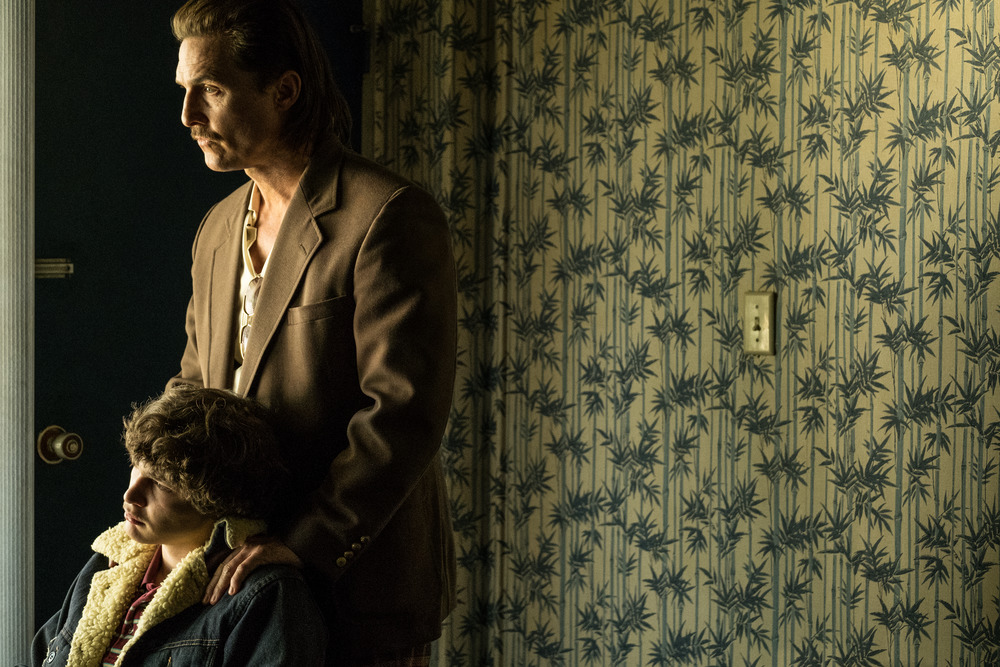Deep Focus: White Boy Rick

The sweet-and-sour mystery of youth gets a funky fact-based workout in the volatile urban comedy-drama White Boy Rick. It’s 1984, and in the drug-ravaged streets and roller-boogying play lands of riot-scarred East Detroit, Rick Wershe Jr., aka White Boy Rick, becomes a 14-year-old FBI informant—the youngest in agency history—and evolves into a mini-kingpin of the Motor City crack trade. Pitting the intensity of childhood against the decay and corruption of underclass city life has been the strategy of many Young Adult novels and a packet of great movies from De Sica’s Shoeshine to Hector Babenco’s Pixote. But Rick’s sly-eyed eagerness, curiosity, and force continuously surprise and enthrall us. White Boy Rick isn’t in the same league as those classics, but for much of its 111-minute running time it gives the audience a seriocomic rush. The filmmakers never figure out a full and satisfying ending for a real-life story that culminates in a paralyzing injustice. But if the climactic shocks are just sketched in, the others are vivid and alive.
The director, Yann Demange (’71), was born in Paris to a French mother and Algerian father and raised in London from age two. He’s got a bubbly melting pot instinct for the anarchic freedom and the grand and not-so-grand illusions that make the material and characters so distinctively American. Rick drives a car with vanity plates that proclaim him a coke dealer—“SNO MAN”—but refuses to pin himself to any one identity. He keeps his informing life secret and lives with his dad in their modest single-family East Side house. His beloved sister Dawn, a crack addict, is played with rare brio and empathy by English actress Bel Powley (The Diary of a Teenage Girl). There has rarely been a movie name as poignant and ironic as “Dawn” is for this prematurely used-up woman.
Until higher powers close in on Rick at the jolting bitter end, he will not function as a cog in anyone else’s criminal or political machine. He has the openness of a child, and the mulishness, too. He initially resists enlisting with FBI agents (Jennifer Jason Leigh and Rory Cochrane) and a Detroit narcotics detective (Brian Tyree Henry). He gives in to them because they threaten to bring the law down on his dad, Richard (Matthew McConaughey), a licensed gun dealer who illegally fits handcrafted silencers to assault rifles.

Richard exults in being an All-American hustler. He’s proud when Rick Jr. spots a fake AK-47 at a gun show and they treat it as a chance to gouge the salesman. Richard divides the world into lions and lambs and angles for Rick to become the King of the Beasts. Richard doesn’t want to leave Detroit, reasoning that lions don’t abandon the Serengeti. But he doesn’t want his son to lose his way in the drug culture, either. In a killer piece of folk commentary, Richard says he views gun dealing as an honorable trade since firearms (unlike drugs) are protected in the Constitution.
The screenplay has been credited to Andy Weiss and the brother team of Logan and Noah Miller (also executive producers), who had worked on separate scripts for competing projects. Over the last two years, the uncredited Steve Kloves (The Fabulous Baker Boys, Wonder Boys, the Harry Potter saga) has been reported as the author of the final draft. The production had access to the real-life Rick and the rights to his life story. Demange must have chosen the best of everything and pulled it all together, since the result is often terse and funny.
Despite his life’s disappointments, Richard considers himself a “glass-half-full” kind of guy. He tells Rick that his kids weren’t planned—he urgently wants to feel that they both turned out all right. Rick shoots back that Dawn’s a crack addict and he defecates into a bag. (He’s recovering from a gunshot to his gut.) When Dawn says that Richard’s wife left him because he was abusive, he responds that she left Dawn and little Rick, too. The movie’s plainspoken banter crackles. Rick buys a giant gold Star of David necklace without knowing what it represents. Richard asks his son when he converted. That dig doesn’t bother Rick, who quickly learns how to stop worrying and love the bling.
Early on, as Richard’s right-hand-boy and pitch artist, Rick hooks Johnny “Lil Man” Curry (Jonathan Majors) into a gun sale by telling him that the silencers are real James Bond stuff. As a tattler for the FBI-Detroit P.D. task force, Rick cozies into the Curry Brothers’ disco-stylish gang, which includes Leo aka “Big Man” (YG) and the younger Rudell or “Boo” (R.J. Cyler), who weans Rick off his “K-Mart” fashions and becomes his best bud. Rick learns that there’s little distance between Detroit’s criminal high-life and its political royalty. Johnny Curry turns policemen into employees and marries the glamorous niece of Mayor Coleman Young, Cathy Voisan (Taylour Paige). And after the Curry gang gets busted, Rick moves in on Cathy. Rick’s amorality, or pre-morality, is shocking because Demange presents it matter-of-factly. This director doesn’t sermonize over his characters.

Demange views the movie as a tale of two clans. Johnny is intent on creating a better life for his kid brother Boo. He becomes a part-time surrogate father for Rick, too. But he turns into an anti-role model when he bludgeons a rival with a champagne bottle at a Curry Brothers outing in Las Vegas (for the Tommy Hearns / Marvin Hagler title bout). Johnny warns Rick against roping Boo into anything too risky, because if a Curry gets arrested, he does “black time,” while Rick will do lighter “white time.” The killer irony is that the opposite turns out to be true.
Demange is at his peak when he works out the clannish conflicts tragicomically, especially with the Wershes. Richard wants to bond over frozen custard with his kids, even after he chases Dawn’s low-life lover out of the house, where the semi-clothed man collides with the beloved Chrysler Imperial of Grandpa Wershe (Bruce Dern), who lives across the street. Powley displays her ferocious acting commitment as Dawn races after her man in a T-shirt and bikini-bottom underwear (Dawn always gets caught in her skivvies). Grandpa goes into a raspy snit. Piper Laurie, as Grandma Wershe, intones in a deep, commanding, deadpan voice, “It looks like Richard is having a hard day.”
White Boy Rick has an indelible feel for the quotidian craziness of families. In one droll oddball scene, an unwanted plate of pancakes gets passed around, and each recipient hears that they were made for that person. Dern and Laurie prove that actors with formidable presences can add piquant, living, breathing textures to roles that could have been mere placeholders. McConaughey and Richie Merritt (who plays Rick) get to do a whole lot more. With his lank hair falling back in a ruined mullet and a small pot jutting out from his wiry frame, McConaughey is magnificent as an overgrown boy-man who knows in his bones that he has failed as an adult. He conjures a down-home bravado at the gun show that’s elating. What makes the performance stick is the ruefulness and mortification McConaughey embodies at the end, when Richard realizes how badly he has let Rick down. McConaughey, like Kevin Costner, has learned how to burn off anything fake or excessive.

With Merritt, a 15-year-old first-timer from Dundalk in Baltimore County, Maryland, there’s nothing false to begin with. Sporting a sad attempt at a moustache on his round and seemingly innocent face, Merritt manages to be alert and evasive, “in the moment” yet slightly out of it. He sometimes appears to let conversations pass right over him, while he’s actually taking everything in. His unconventional, eye-opening performance represents what a dramatic feature can do that even first-class narrative journalism like Evan Hughes’ scrupulous and involving “The Trials of White Boy Rick” can’t. The movie may collapse some facts, fiddle with chronology, and employ composite characters, but the unfiltered candor of Merritt’s responses brings us intimately close to Wershe’s story. The film would not work if Merritt were uneasy with the African-American ensemble (and vice-versa). We acquire a visceral sense of what they get from their environment (flash and excitement) and what they don’t (sustainable relationships and non-materialistic values).
Demange displayed his gifts for beckoning us into an emotion-charged milieu, creating rippling documentary textures and turning layered conflicts inside out, in his superb debut feature,’71, about a British soldier struggling to make his way to safety through IRA strongholds in Belfast. It played like a latter-day action-movie take on Odd Man Out. White Boy Rick has more conspicuous flaws, but it’s also more original and open-ended. Demange, with his favorite cinematographer, Tat Radcliffe, has developed a technique that marries an electric neorealism to the improvisational, subtly stylized stagecraft of Mike Leigh. Demange plants his camera in the middle of the actors for his first one to 10 takes, then selects revealing dramatic moments to choreograph and capture. Because he takes his cues from the movement of the actors, we experience what their characters do without obtrusive or “subjective” angles. The effect is veracious and primal but also dreamlike. That’s an ideal expression of this movie’s larger point, which is not merely the unfairness of sentencing guidelines for drug crimes, but also the persistence of the American Dream.
Richard may be comical, but he’s never ridiculous, nor is his fantasy of reuniting everyone around a family-owned-and-operated video store. We call it the American Dream, not the American Fact. White Boy Rick gives us both.
Michael Sragow is a contributing editor to Film Comment and writes its Deep Focus column. He is a member of the National Society of Film Critics and the Los Angeles Film Critics Association, and a contributor to the Criterion Collection.







